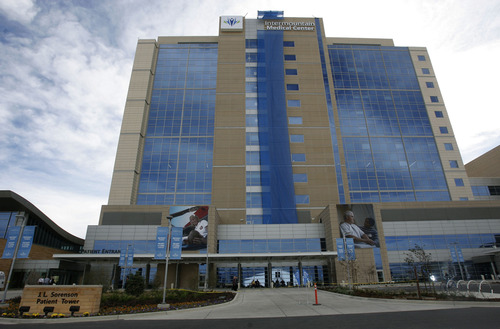This is an archived article that was published on sltrib.com in 2013, and information in the article may be outdated. It is provided only for personal research purposes and may not be reprinted.
A Utah neurologist blames Intermountain Healthcare for the closure of her clinic and claims the nonprofit system's care for stroke patients "can only be described as a crisis."
Nancy Futrell alleges Intermountain refused to allow its patients who had strokes or transient ischemic attack (TIA), "mini-strokes," to receive care at her Salt Lake City outpatient center because it wanted to safeguard revenue for its hospital emergency rooms.
And by failing to provide access to timely follow-up care, Intermountain "literally has placed its [patients] at risk for stroke and subsequent complications," charges the lawsuit filed Tuesday in 3rd District Court.
Intermountain spokesman Daron Cowley called the allegations "baseless."
"There are many hospitals in Utah that have been designated as primary stroke centers or stroke receiving centers. Utah, including Intermountain, does very well with stoke care," said Cowley.
Intermountain has repeatedly been held out by President Barack Obama, and others, as an example of how to deliver high-quality, low-cost care.
But Futrell asserts that urgent-care stroke clinics such as her business, The Intermountain Stroke Center, provide more efficient, less costly care for same-day, non-emergency treatment of strokes and TIA.
By comparison, the Intermountain system locks patients into unnecessary costs and risky delays in follow-up care, she says.
The lawsuit alleges Intermountain and its insurance arm, SelectHealth, conspired to drive Futrell out of businesses. Futrell, a board-certified vascular neurologist, and the center were not included on SelectHealth's provider panels between 1997 and the clinic's closure in March 2013.
Citing studies, Futrell says patients should be hospitalized for 24 to 48 hours following a TIA, or referred to urgent care stroke clinics.
But Intermountain hospital emergency rooms "frequently" do not admit stroke patients for overnight observation, she says. Instead, they tell them to schedule an appointment with an Intermountain neurologist within one to two weeks.
And, the lawsuit alleges, patients "typically" are unable to get an appointment with an Intermountain neurologist within that time frame, putting their health at risk.
Cowley did not speak to wait times, but contends Intermountain admits TIA patients for 24-hour observation following American Stroke Association guidelines.
University Hospital has the same policy.
"As for follow-up, that is individualized to the patient. We see about 80 percent of our own follow-ups in our stroke clinic, but patients also may follow-up with a previous neurologist or their primary care provider," said Jennifer Majersik, a professor of neurology at the University of Utah.
Jeremy Payne, a vascular neurologist at the Banner Good Samaritan Medical Center in Phoenix said the research is clear: "The risk for stroke [for TIA patients] is high but can be mitigated."
Not all TIA patients need to be hospitalized, and rapid-referral TIA clinics are a "reasonable use of resources," said Payne, an American Heart Association board member. But some ER doctors are loathe to refer patients, he said. "They're not often willing to just let their patients go home, because they might not seek follow-up care, which they should within two to three days."
It's not the first time Intermountain, Utah's largest hospital chain, has been accused of wielding its size to edge out the competition. In 2001, a group of optometrists sued to get on Intermountain's provider network and lost. They alleged violation of the Sherman Act, unsuccessfully.
Futrell's suit seeks more than $3 million in damages on four claims: interference with economic advantage, two civil conspiracy counts and violations of the federal Truth in Advertising Act, plus punitive damages.
Intermountain hospitals treated 852 stroke patients in 2011, more than any other health center in the state, according to its annual stroke report.
Yet few of the heart and vascular doctors listed on its website specialize in stroke treatment, Futrell alleges.
Twitter: @kirstendstewart —
A Q&A with Nancy Futrell in Neurology Today
O Go to http://bit.ly/10R7GGs



